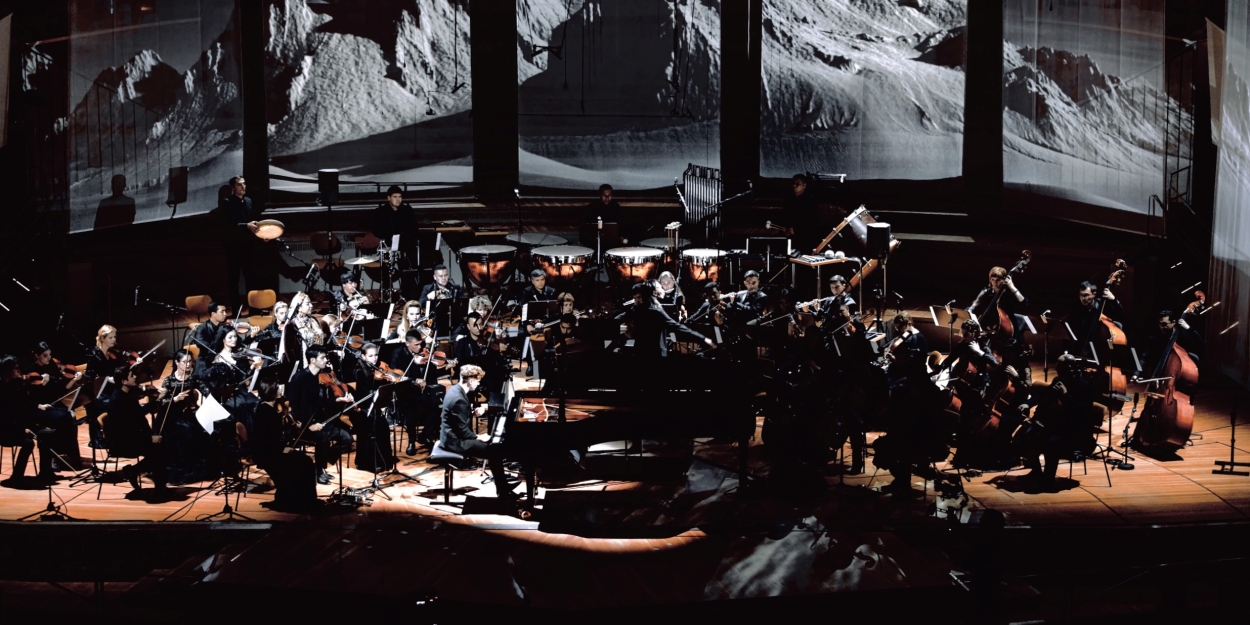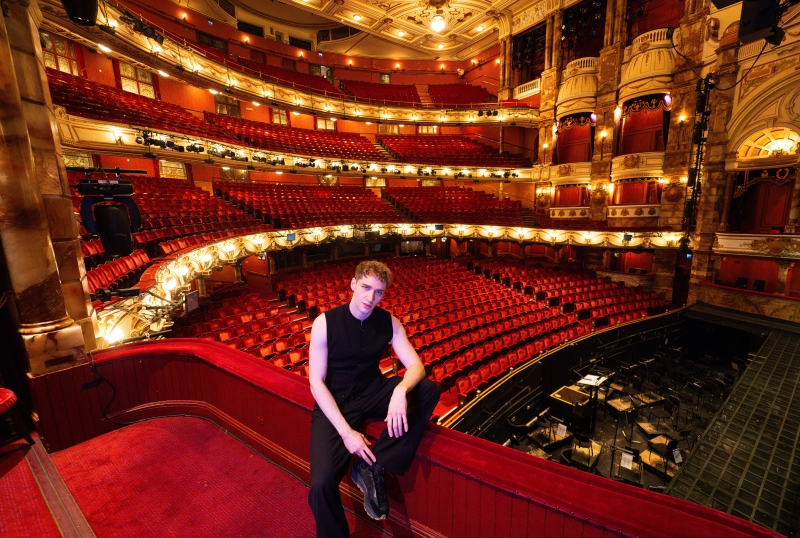Review: KIRILL RICHTER - THE SANDS OF TIME, London Coliseum
Ever been upstaged at your own party? The Russian-born composer and musician brings his latest opus to London for one night only.

![]() Have you ever invited a guest to your own party and then seen them totally upstage you? If so, spare some sympathy for Kirill Richter who presented his new work The Sands Of Time alongside the National Symphony Orchestra of Uzbekistan for one night only at the London Coliseum.
Have you ever invited a guest to your own party and then seen them totally upstage you? If so, spare some sympathy for Kirill Richter who presented his new work The Sands Of Time alongside the National Symphony Orchestra of Uzbekistan for one night only at the London Coliseum.
It doesn’t take too long for the artistic connections between the Russian-born musician and composer and his British namesake Max Richter to form. The latter is far better known, not least for the melancholy brilliance of his work on the criminally underrated and prescient HBO drama The Leftovers, a 2014 TV show that explored what it would be like to live in a world a few years after 2% of the population suddenly disappeared (sound familiar?).
Both Richters pull from a similar well, at least musically. Contemporary postminimalism is the name of their game with hefty nods to complementary strands of high culture. The opening two-thirds of the night sees Richter on the piano between the other two members of his trio (cellist August Krepak and violinist Alena Zinovieva). Putting just three musicians on an 80ft stage in the West End’s largest auditorium was always going to be a brave move and it doesn’t quite come off. They are enveloped in an intensely crepuscular atmosphere delivered through chiaroscuro colouring: dimmed lighting prevails while spotlights pick out the trio dressed all in black and, in the background, swirling monochrome images are projected onto floor-to-ceiling screens. If “goth classical” was a thing, this is what it would look like.
Together, they work their way through a dozen Richter compositions including “Michigan 7”, “In Memoriam” and “Waltz No7 Towards The Beloved City” with odd snatches of poetry heard between pieces. They produce a pleasant, inoffensive and somewhat underwhelming sound that rolls and rumbles gently.
The bland AI-generated visuals help enhance the tempo whenever it rises beyond the somnambulant but there’s barely any notable oomph and a general lack of tonal variety (Trio No1 in D Moll is played twice according to the programme). On the evidence of what was presented in the first part, the young-looking Richter is no Nigel Kennedy looking to use his punky stylings to stir up classical music; rather, his work would quite happily slot into my bedtime playlist. Max Richter wasn’t himself above creating sedative sounds but, in his case, his eight-and-a-half opus Sleep was a deliberate move.
That’s not to say that there aren’t memorable displays of individual skill. Zinovieva attacks some pieces with real passion, her head down, her bow goes from very slow long movements aching with longing to manic bursts of sparky zigzagging. Krepak slaps, spanks and beats his bass with his hand when not bouncing his bow off the strings or plucking them spryly. Although his playing is generally more piano than forte, Richter at points dramatically throws his head back and around, peering into the depths of the Coliseum ceiling as he lets his fingers and feet do all the work.

Photo Credit: Elliott Franks
The show promises a “unique, dazzling and deeply immersive one-night-only multi-media event” and, going by what is shown before the interval, this certainly seems to be a case of overselling. The blend of massive original video projections and classical music shown thus far is not particularly immersive and neither is it unique: last November’s 7 Deaths Of Maria Callas (which may just as well have been called 90 Minutes Of Marina Abramović) was a more powerful example of this stirring combination. The second part of the evening, though, brings in the full orchestra and that is where the real magic suddenly happens.
Labelling Alibek Kabdurakhmanov a conductor is like calling the moon a rock. With black hair reaching down to the shoulders of his dark suit, the lanky figure stands not down in the pit but on stage surrounded by his musicians and with his back turned to the audience. He fervently takes us through seven more of Richter’s pieces, climaxing with “The Sands Of Time” featuring vocals from soloist Nodira Pirmatova. Instead of the vague animations we saw before, the post-interval backdrops are far more ebullient: roiling, boiling seas give way to epic starscapes, a blazing yellow sun and fiery meteors that crash down to earth and raise billowing columns of grey smoke.
Kabdurakhmanov is more than a match for these awe-inspiring sights. On his podium, he towers over Richter and the rest of the orchestra. The music seems to flow into and through him turning him into a literal conductor of sorts. Arpeggios that were a tad twee and anodyne before the interval are now blasts of sonic energy channelled from Kabdurakhmanov’s body, out into the musicians and reverberating around the auditorium. Sans batons, he moves frenetically, his long locks swishing this way and that, his long arms sweeping majestically around to invite the various sections to join in.
There’s a definite emphasis on percussion here and, at times, he becomes an intense totem, closing his hands into stubby throbbing fists to sharply dictate the rhythm. Whether he intends to or not, his charismatic display is the kind of showmanship sorely lacking in the European classical music scene. Who needs a new conductor?
Kirill Richter - The Sands of Time was at the London Coliseum on 11 September
Reader Reviews
Videos

